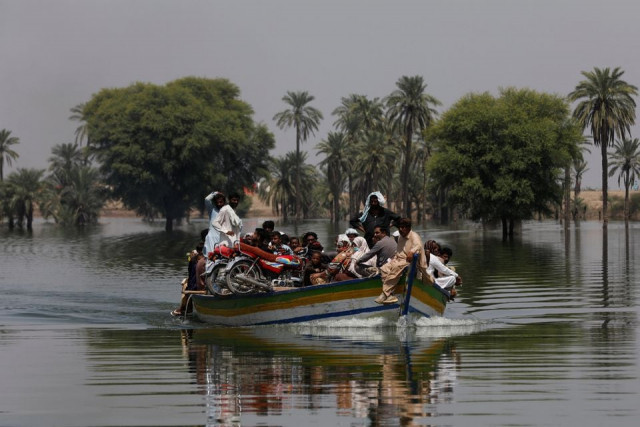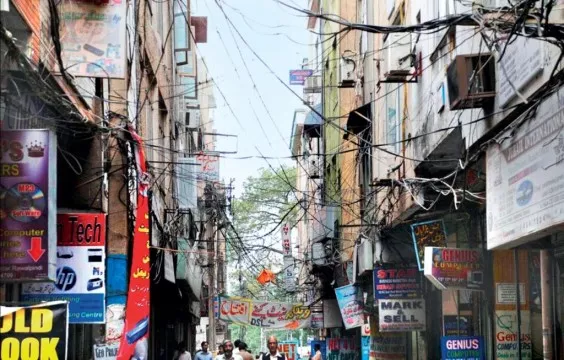‘Replicate Covid lessons in flood-hit areas’
Speakers say SMEs struggling for survival amidst decline in capital and investment

Speakers have said that lessons from the Covid-19 should be replicated and modified to strengthen response and recovery from large-scale losses incurred during the current floods.
They were speaking at the launch of a study titled: “Micro, Small and Medium Enterprises amid Disaster: Lessons from Pakistan’s Experience”.
The research conducted jointly by the Sustainable Development Policy Institute (SDPI) and International Development Research Centre (IDRC) was based on 750 firms across the country with special focus on women-owned and women-led firms. Among other factors, the study highlighted the impacts of supply chain and transmission disruption, resilience to bounce back, and efficacy of government interventions.
SDPI Joint Executive Director Dr Vaqar Ahmed said that the study revealed that at initial stages of the crisis, there was a decrease in import-export, production and short-term consumption patterns along with liquidity squeeze and decline in capital and investment, which has left the MSMEs struggling for survival.
He said said that tax reforms and subsidies did not have much positive impact and majority of the SMEs could not avail public financial facilities due to lack of awareness, doubts, cumbersome transaction costs and process whereas informal borrowings remained highly preferred. He suggested that communication channels must be improved exponentially to improve the response to crisis.
Dr Vaqar also recommended that transaction costs and time for registration of SMEs should be streamlined, and government should support resilience and recovery of SMEs through specific quotas.
Meanwhile, Dr Arjan De. Haan, Senior Program Specialist, Sustainable Inclusive Economies, IDRC stressed the need to realise that governments and other stakeholders need well-researched data and policy recommendations to recover and develop resilience to COVID-19. He said that the research analysed the impact of COVID-19 on MSMEs and utilises gender perspective to further understand the impact on different stakeholders and women-led firms.
Faheem Sardar, Senior Policy Specialist, Prime Minister’s Office said that it is crucial to identify hidden disasters and crisis and solution to these issues.
He informed the participants that the processing and clearance time in cross-border trade has been brought down to 24 hours after one-window operation was introduced. He further said that MSMEs must abide by “evolve or die” dictum when it comes to e-commerce which has simplified and sped up interaction between seller and buyer. “While there is tremendous growth in e-commerce, it is crucial to remember that it creates space for cyber-crimes, which is more than worth US$3 trillion per annum,” he said.
Ms Nadia J. Seth, General Manager, Policy and Planning Division, SMEDA said that 70% of SMEs are informal and unregistered which hinders their access to government facilities. Till March 2021, the State Bank of Pakistan provided Rs 435 billion to SMEs through various COVID-19 relief and recovery initiatives, she said, adding that such initiatives are based on learnings from post-2010 flood initiatives. So far, nearly half of the SMEs are still unaware of these initiatives mainly due to poor communication strategy, weak linkages between SMEs and government due to low registration and formalisation.
Ms Kiran Afzal, Private Sector Development Specialist, World Bank, said that tourism and heritage sites across the country have been extensively damaged. In Khyber Pakhtunkhwa alone, an estimated amount of $80,000-90,000 is required for post-flood conservation and restoration.
She suggested that private sector needs to increase financial and technical capacity, and emergency response services to support the SMEs to recover from major shocks. She stressed the need for climate resilient infrastructure development in the long-term plan with emphasis on environment impact assessment and implementation of construction by-laws.
Dr Aadil Nakhuda, Assistant Professor of Economics, Institute of Business Administration and co-author of the study, briefed the audience that the survey targeted SMEs across Pakistan; younger than 10 years as they lack the experience to manoeuvre through major shocks like COVID-19 and climate disasters.
He said that the study identified that nearly 50% of the SMEs were informal and not registered mainly due to procedural difficulties and high cost. He further highlighted various other factors which left SMEs vulnerable and how these impacts varied across the country, based on size and gender.
Izzah Shahbaz, Principal of Credit, Karandaaz Capitals, said that private financial markets are highly collateralised and the necessary condition of guarantee hinders SMEs from accessing financial assistance.
She further said that research conducted by Karandaaz revealed that stringent corporate governance discourages SMEs from entering formal sector and registration, which also disables them from accessing formal public financing initiatives leaving them vulnerable to external shocks.
Published in The Express Tribune, September 26th, 2022.


















COMMENTS
Comments are moderated and generally will be posted if they are on-topic and not abusive.
For more information, please see our Comments FAQ